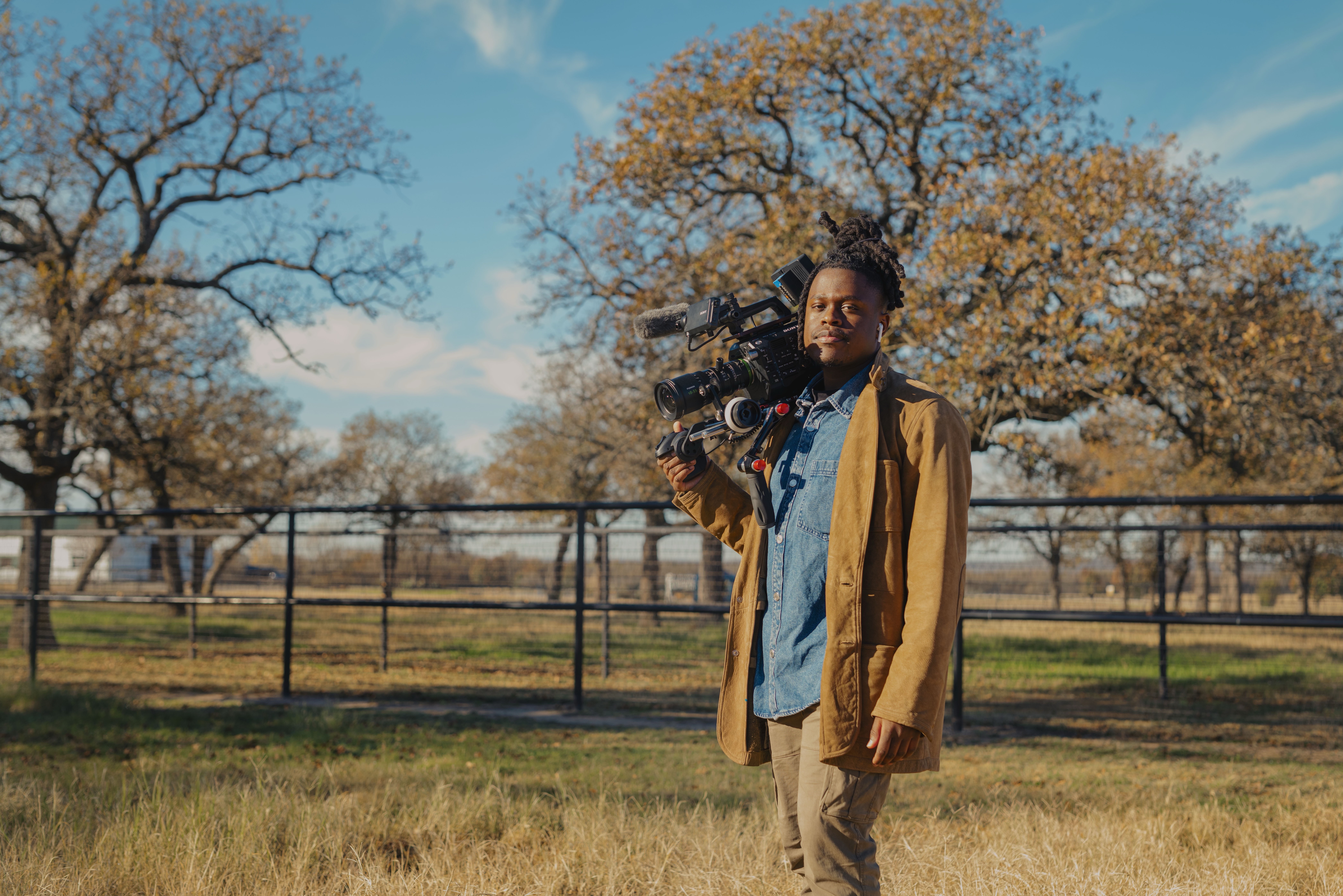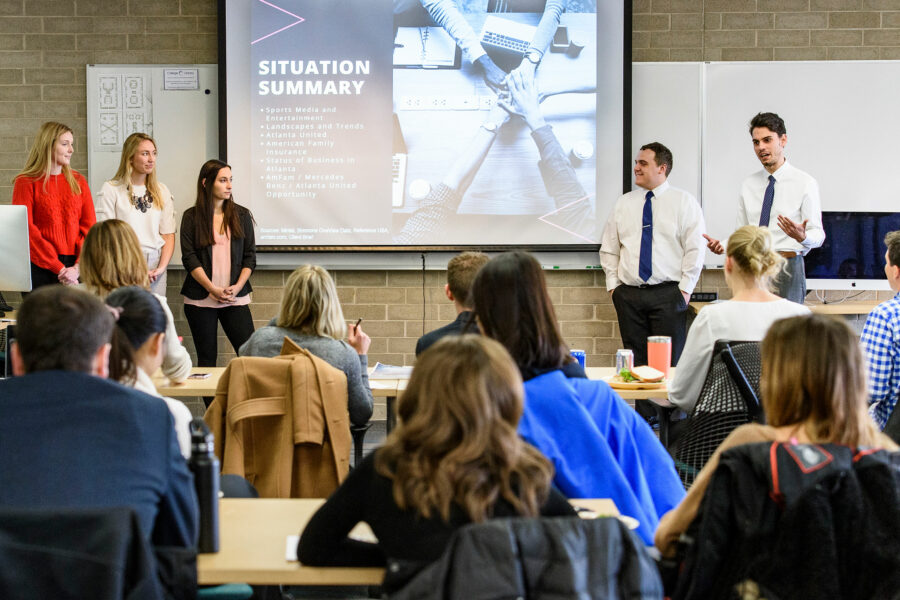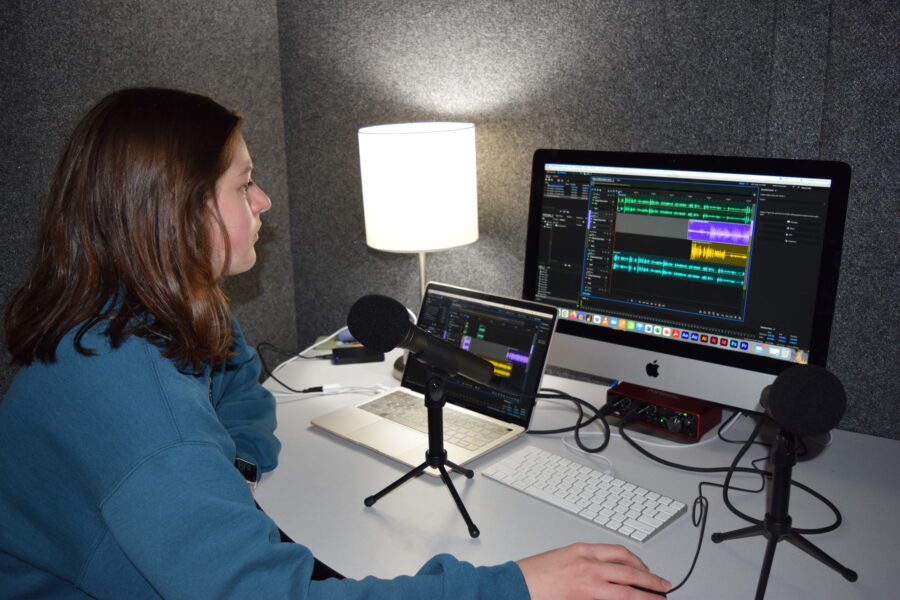The undergraduate major in the School of Journalism and Mass Communication offers an unequaled blend of skills training, theoretical learning and real-world practice. As a result, our graduates leave as able practitioners, critical thinkers, seasoned problem solvers and innovators.
Our program prepares students for jobs in public relations, reporting, advertising, marketing, political and health communication, and digital and social media, as well as professional positions in sports communication, magazine publishing, video production and multimedia design, among others. Our graduates go on to be leaders in their chosen fields.
Explore Our Degree Concentrations
In today’s global economy, skilled and passionate storytellers are in demand now more than ever. From advertising to investigative journalism to public relations to podcasting, our degree can launch you into a wide range of careers. The School of Journalism and Mass Communication offers two degree concentrations: strategic communication and multimedia reporting. Students may choose one or both of these concentrations.
Are you interested in
- Getting in on the ground floor of an ad agency or public relations firm and working with the leading brands of the day?
- Leading digital and social media for a non-profit changing people’s lives?
- Breaking news stories that influence public policy?
- Informing and entertaining through video, audio and social media?
- Connecting sports franchises with their fans and their communities?
- Using data and insights to engage audiences?
- Traveling the world to tell important stories about people and places?
- Setting trends in the arts, culture and fashion?
- Getting an education that will take you places you can’t even imagine right now?
Then this is the place for you.
Strategic Communication
Learn how to inform and persuade your audience. Gain in-demand, transferable skills to prepare for a career in advertising, public relations, political communication, social media, digital marketing and more.
Reporting & Multimedia Journalism
Journalism today goes far beyond the traditional newsroom. Gain real-world experience and prepare for your future career with courses on in-depth reporting, magazine publishing, video journalism and more.
Scholarships and Financial Aid
Thanks to the generosity of our alumni, the School of Journalism and Mass Communication has one of the most generous scholarship programs on campus. In 2023, the School awarded all 104 scholarship applicants with scholarships ranging from $500 to $16,000. All current SJMC undergraduate students are eligible to apply, including seniors planning to graduate in the upcoming spring or summer terms. Students complete one application and the scholarship committee then matches them with the best scholarship. Scholarships are awarded based on financial need, academics, area of study and involvement.
See Where Our Degree Can Take You
Gillian Quinn (JBA'20) – Senior Campaign Manager, Spotify
"The things you learn in J-School classes give you a small preview into what careers you can pursue with the degree; I’m now working in a field I didn’t even know existed, all thanks to setting up time with people in all different types of roles."

Arvind Gopalratnam (JBA'04) — VP, Corporate Social Responsibility for the Milwaukee Bucks; Executive Director, Milwaukee Bucks Foundation
"My J-School degree is one of my proudest accomplishments to date and provided me the foundation, tools and confidence needed to set me on my communications career path."

Rory Linnane (JBA'13) — K-12 Education Reporter, Milwaukee Journal Sentinel
"I loved the opportunities to get reporting experience through student newspapers, Wisconsin Watch and other outlets. I've come to deeply appreciate the classes on media law, history, ethics and how power and privilege have shaped media narratives."

Marquise Mays (JBA'18) — Award-Winning Documentary Filmmaker & Associate Lecturer of Non-Fiction Production at UW-Milwaukee
"In the J-School, I was challenged (and given the space) to critically engage with forms of storytelling and artmaking that best fit my journalistic voice, blending my love for filmmaking and journalism within a short period of time."

Ilana Fromm (JBA'14) – Director of Lifecycle Marketing, Little Spoon
"I think the ability to write well and tell stories effectively is valuable in any communications or marketing-related career and so much of my skill set there is because of the work I did in the J-School."

Samuel Hon (JBA'03) – CEO, First Corporate Solutions; Lecturer; Executive Coach
"My Strategic Communication degree equipped me with communication and critical thinking skills essential for launching my career. This strong foundation was pivotal in accelerating my journey, which led me to become a CEO and Executive Coach."


